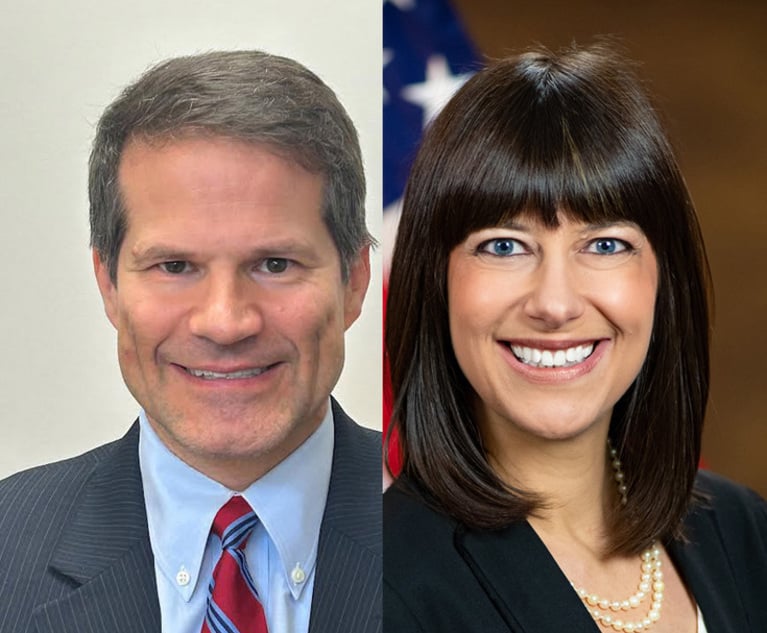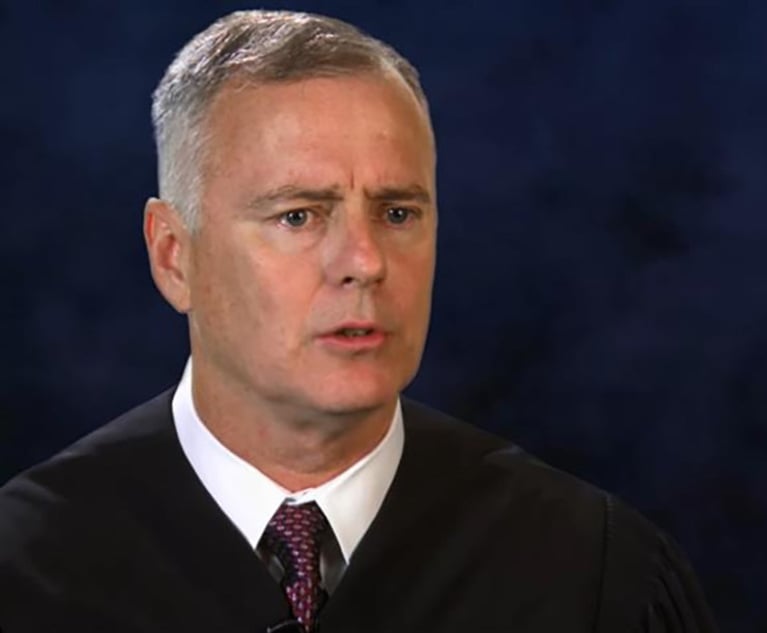Global Injunctions Are 'Disturbing', DOJ Tells Justices in New Travel-Ban Brief
The Justice Department argues in the Supreme Court: "The president's proclamation and the executive orders that preceded it reflect a disturbing recent trend. Lower courts increasingly grant categorical injunctive relief barring enforcement of federal policies everywhere at the behest of individual litigants."
February 22, 2018 at 12:32 PM
5 minute read
 Office of the Solicitor General at the U.S. Department of Justice in Washington, D.C. Credit: Mike Scarcella/ NLJ
Office of the Solicitor General at the U.S. Department of Justice in Washington, D.C. Credit: Mike Scarcella/ NLJ
U.S. Solicitor General Noel Francisco filed the government's opening brief Wednesday in the U.S. Supreme Court in what may be the final battle over the Trump administration's ban on the entry into the United States of foreign nationals from predominantly Muslim nations.
 Solicitor General Noel Francisco. Credit: Diego M. Radzinschi/ The National Law Journal
Solicitor General Noel Francisco. Credit: Diego M. Radzinschi/ The National Law JournalThe so-called travel ban, now in its third iteration, restricts the entry of certain nationals from eight countries that pose national security risks, according to the administration. President Donald Trump issued the travel proclamation on Sept. 24. The targeted countries are Iran, Chad, Libya, Syria, Yemen, Somalia, North Korea and Venezuela.
The state of Hawaii, three individuals and the Muslim Association of Hawaii challenged the entry restrictions, except for nationals of North Korea and Venezuela. A federal district court issued a preliminary, global injunction after finding that the travel ban violated the Immigration and Nationality Act. The U.S. Supreme Court issued a stay of that injunction pending proceedings on appeal and in the high court. The president's ban is in full effect.
The justices will hear arguments in Trump v. Hawaii on April 25, the last argument day of the term. Hogan Lovells partner Neal Katyal represents the Hawaii challengers.
The case poses four questions for the high court: Is the challenge to the ban justiciable? Is the ban a lawful exercise of the president's authority to suspend entry of aliens? Does the ban violate the Constitution's establishment clause? Is the global injunction impermissibly overbroad?
Here is a quick look at the U.S. government's main arguments:
Nothing to see: The travel ban is not reviewable. “It is a fundamental separation-of-powers principle, long recognized by this court and Congress in the INA, that the political branches' decisions to exclude aliens abroad generally are not judicially reviewable,” the DOJ brief said. “That principle bars any review of respondents' statutory claims. respondents have also invoked the establishment clause, but they assert no cognizable violation of their own rights under that clause.”
What Trump said? Don't listen to that. “Impugning the official objective of a formal national-security and foreign-policy judgment of the president based on campaign-trail statements is inappropriate and fraught with intractable difficulties.”
The brief added, “It also thrusts 'ill equipped' courts into the untenable position of evaluating the 'adequacy and 'authenticity' of the executive's foreign-affairs and national-security judgments. And it invites impermissible intrusion on privileged internal executive branch deliberations, and potential litigant-driven discovery that would disrupt the president's execution of the laws. This court should reject a rule that invites such probing of the chief executive's supposed subjective views.”
DOJ: Down with global injunctions! “The lower courts' decisions in this litigation and in IRAP repeatedly upholding global injunctive relief against the president's proclamation and the executive orders that preceded it reflect a disturbing recent trend. Lower courts increasingly grant categorical injunctive relief barring enforcement of federal policies everywhere at the behest of individual litigants,” the DOJ said in its brief.
The DOJ lawyers continued: “Such an order by a single district court enjoining a federal policy everywhere frequently brings judicial review in all other fora to a halt and deprives other courts, including this court, of differing perspectives on important questions. Permitting such global injunctions also undercuts the primary mechanism Congress has authorized to permit broader relief: class actions.”
The brief concluded with this line: “This court should reject that deeply misguided practice and reiterate that injunctions should be tailored to redress the plaintiffs' own cognizable, irreparable harms.”
The DOJ's bottomline: Trump's travel ban has “facially legitimate purposes.” “The proclamation is explicitly premised on facially legitimate purposes: protecting national security and the national interest by preventing entry of persons about whom the United States lacks sufficient information to assess the risk they pose, and furthering foreign policy by encouraging other nations to improve their practices,” DOJ lawyers wrote.
“The proclamation's 'text, legislative history, and implementation' all confirm that its official objective' is religion-neutral,” DOJ's legal team continued. “The multi-agency review that produced the proclamation and its tailored entry restrictions dispel any contention that it is infused with religious animus.”
The Justice Department's brief is posted below:
Read more:
This content has been archived. It is available through our partners, LexisNexis® and Bloomberg Law.
To view this content, please continue to their sites.
Not a Lexis Subscriber?
Subscribe Now
Not a Bloomberg Law Subscriber?
Subscribe Now
NOT FOR REPRINT
© 2024 ALM Global, LLC, All Rights Reserved. Request academic re-use from www.copyright.com. All other uses, submit a request to [email protected]. For more information visit Asset & Logo Licensing.
You Might Like
View All

Trump's Solicitor General Expected to 'Flip' Prelogar's Positions at Supreme Court

Auditor Finds 'Significant Deficiency' in FTC Accounting to Tune of $7M
4 minute read
Texas Court Invalidates SEC’s Dealer Rule, Siding with Crypto Advocates
3 minute readTrending Stories
- 1Gibson Dunn Sued By Crypto Client After Lateral Hire Causes Conflict of Interest
- 2Trump's Solicitor General Expected to 'Flip' Prelogar's Positions at Supreme Court
- 3Pharmacy Lawyers See Promise in NY Regulator's Curbs on PBM Industry
- 4Outgoing USPTO Director Kathi Vidal: ‘We All Want the Country to Be in a Better Place’
- 5Supreme Court Will Review Constitutionality Of FCC's Universal Service Fund
Who Got The Work
Michael G. Bongiorno, Andrew Scott Dulberg and Elizabeth E. Driscoll from Wilmer Cutler Pickering Hale and Dorr have stepped in to represent Symbotic Inc., an A.I.-enabled technology platform that focuses on increasing supply chain efficiency, and other defendants in a pending shareholder derivative lawsuit. The case, filed Oct. 2 in Massachusetts District Court by the Brown Law Firm on behalf of Stephen Austen, accuses certain officers and directors of misleading investors in regard to Symbotic's potential for margin growth by failing to disclose that the company was not equipped to timely deploy its systems or manage expenses through project delays. The case, assigned to U.S. District Judge Nathaniel M. Gorton, is 1:24-cv-12522, Austen v. Cohen et al.
Who Got The Work
Edmund Polubinski and Marie Killmond of Davis Polk & Wardwell have entered appearances for data platform software development company MongoDB and other defendants in a pending shareholder derivative lawsuit. The action, filed Oct. 7 in New York Southern District Court by the Brown Law Firm, accuses the company's directors and/or officers of falsely expressing confidence in the company’s restructuring of its sales incentive plan and downplaying the severity of decreases in its upfront commitments. The case is 1:24-cv-07594, Roy v. Ittycheria et al.
Who Got The Work
Amy O. Bruchs and Kurt F. Ellison of Michael Best & Friedrich have entered appearances for Epic Systems Corp. in a pending employment discrimination lawsuit. The suit was filed Sept. 7 in Wisconsin Western District Court by Levine Eisberner LLC and Siri & Glimstad on behalf of a project manager who claims that he was wrongfully terminated after applying for a religious exemption to the defendant's COVID-19 vaccine mandate. The case, assigned to U.S. Magistrate Judge Anita Marie Boor, is 3:24-cv-00630, Secker, Nathan v. Epic Systems Corporation.
Who Got The Work
David X. Sullivan, Thomas J. Finn and Gregory A. Hall from McCarter & English have entered appearances for Sunrun Installation Services in a pending civil rights lawsuit. The complaint was filed Sept. 4 in Connecticut District Court by attorney Robert M. Berke on behalf of former employee George Edward Steins, who was arrested and charged with employing an unregistered home improvement salesperson. The complaint alleges that had Sunrun informed the Connecticut Department of Consumer Protection that the plaintiff's employment had ended in 2017 and that he no longer held Sunrun's home improvement contractor license, he would not have been hit with charges, which were dismissed in May 2024. The case, assigned to U.S. District Judge Jeffrey A. Meyer, is 3:24-cv-01423, Steins v. Sunrun, Inc. et al.
Who Got The Work
Greenberg Traurig shareholder Joshua L. Raskin has entered an appearance for boohoo.com UK Ltd. in a pending patent infringement lawsuit. The suit, filed Sept. 3 in Texas Eastern District Court by Rozier Hardt McDonough on behalf of Alto Dynamics, asserts five patents related to an online shopping platform. The case, assigned to U.S. District Judge Rodney Gilstrap, is 2:24-cv-00719, Alto Dynamics, LLC v. boohoo.com UK Limited.
Featured Firms
Law Offices of Gary Martin Hays & Associates, P.C.
(470) 294-1674
Law Offices of Mark E. Salomone
(857) 444-6468
Smith & Hassler
(713) 739-1250








